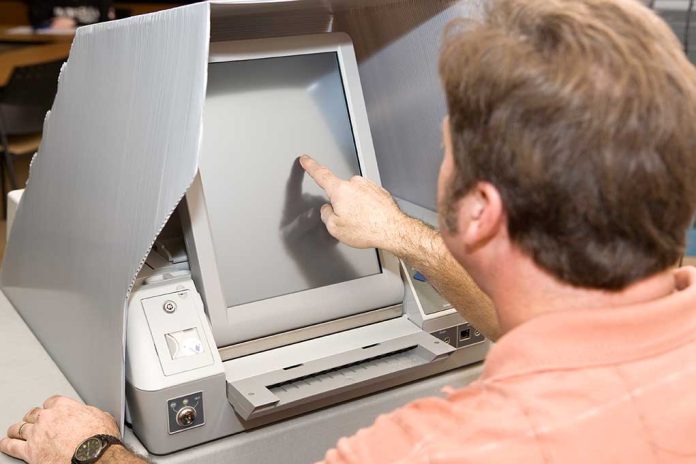
Texas Governor Greg Abbott has decisively acted to prevent non-citizens from casting ballots by signing a historic joint resolution that would amend the state constitution to explicitly ban non-citizen voting.
Key Takeaways
- Governor Greg Abbott signed Senate Joint Resolution 37 to amend the Texas Constitution to explicitly prohibit non-citizens from voting.
- The proposed amendment will appear on the November ballot for Texas voters to decide.
- If approved, Texas would join 15 other states with explicit constitutional language barring non-citizens from voting.
- The resolution passed both chambers of the Texas Legislature with strong Republican support.
- A separate bill requiring proof of citizenship for Texas voters failed to meet legislative deadlines but could be revived in a special session.
Constitutional Amendment to Safeguard Elections
Governor Abbott’s action represents a significant step toward strengthening Texas’s voting laws by explicitly outlining who is eligible to participate in elections. The joint resolution, introduced by Republican State Senator Brian Birdwell, seeks to expand the list of those prohibited from voting to include non-citizens alongside existing prohibitions for minors, convicted felons, and those deemed mentally unfit. The resolution successfully passed both houses of the Texas Legislature before receiving the governor’s signature, setting the stage for a public referendum this November.
In announcing the measure, Governor Abbott emphasized its importance for election integrity. “I just approved a joint resolution to make it obvious in the Texas Constitution that if you are not a citizen of the United States of America, you are not allowed to vote in Texas,” Governor Abbott stated in a video message posted to social media.
Part of a Broader National Movement
The Texas initiative aligns with a growing national trend focused on election security and citizenship verification. Currently, 15 state constitutions already prohibit non-citizen voting, and legislation addressing voter citizenship verification is under consideration in 25 states across the country. The Texas amendment would formalize what supporters consider a common-sense requirement that only American citizens should participate in American elections, particularly as debates over election security continue to dominate political discourse.
“This amendment makes it crystal clear that in Texas, only United States citizens can vote in our elections,” stated Governor Abbott.
The resolution comes at a time when concerns about election integrity remain at the forefront of political discussions across the country. Proponents argue that clear constitutional language will help prevent any potential confusion or exploitation of election laws. If voters approve the amendment in November, Texas will join states like Florida, Alabama, and Colorado that have already enshrined citizen-only voting requirements in their state constitutions.
Companion Legislation Stalls
While the constitutional amendment moves forward, a companion bill that would have required proof of citizenship for all Texas voters failed to meet a key House deadline. Senate Bill 16, which had 50 Republican co-sponsors in the House and passed the Senate along party lines, would have applied retroactively to 18.6 million registered voters in the state. The bill was considered one of the most comprehensive proof-of-citizenship proposals in the country, but it faced significant opposition from voting rights advocates who argued it would disenfranchise eligible voters.
“It was done to harm people and also to scare people out of the process. It was a terrible voter suppression bill. We’re able to celebrate that this bad bill is not going to become law this session,” said Rep. John Bucy, Democrat from Austin.
The stalled legislation would have created a two-tier voting system where voters without proof of citizenship would only be allowed to vote in congressional races and would be barred from mail voting. Election administrators warned the bill could confuse voters and be difficult to implement, with the Texas Secretary of State’s Office estimating initial costs of over $578,000 to overhaul the voter registration system. Despite the bill’s failure, Governor Abbott could still call a special session to address the issue.
Looking Ahead to November
The constitutional amendment will now proceed to the November ballot, where Texas voters will have the final say on whether to explicitly ban non-citizens from voting in state elections. Unlike the failed Senate Bill 16, the constitutional amendment affirms the principle that only U.S. citizens can vote in Texas but does not include specific enforcement provisions. This approach focuses on establishing the constitutional principle while leaving enforcement mechanisms to future legislative action if necessary.
“It’s just a challenge to make this a new policy out of whole cloth, which would require a significant amount of investment in terms of time and money to facilitate and then legally to defend it,” explained Brandon Rottinghaus, political science professor at the University of Houston.
With the resolution now signed and headed to the ballot, Texas voters will determine whether to join the growing number of states that have formalized citizenship requirements for voting. The outcome could influence similar efforts across the country as states continue to evaluate and strengthen their election systems against potential vulnerabilities.














